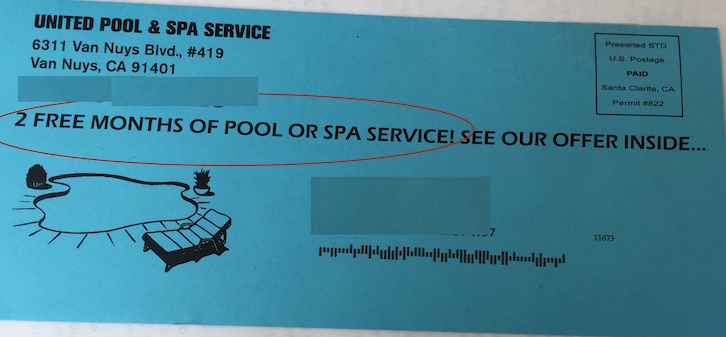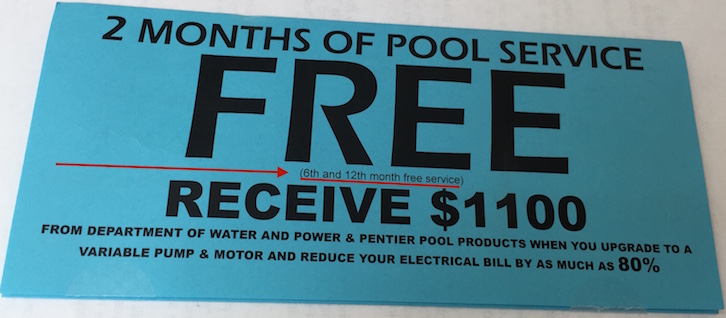 Sorry, this video no longer is available.
Sorry, this video no longer is available.
To learn how to create world-class radio advertising, click here.
 Sorry, this video no longer is available.
Sorry, this video no longer is available.
To learn how to create world-class radio advertising, click here.
 Sorry, this video no longer is available.
Sorry, this video no longer is available.
To learn how to create world-class radio advertising, click here.
The other day I was astounded to see a brilliant marketing offer in my mailbox:
“2 Free Months of Pool or Spa Service”

When I turned over the tri-folded flyer, however, here’s what I saw.

The “2 free months” promoted in a large, bold headline on the front side turned out to be the 6th and 12th month of one year’s service (yawn)…
…noted in the tiniest type size used anywhere on the flyer.
“Well, what’ya expect, Dan? That a pool service company is going to try to attract business by offering new clients 2 months’ service for free? No strings attached? No one-year requirement?”
Yes, that’s what I expect.
At least, that’s the kind of thing I expect in a Great Offer.
It can be limited to
• New clients
• Residential pools (single residences only; not apartments)
• Owners only
• Within a specific geographic area.
Think about it.
What do you know about the people who would respond to such an offer?
• They are homeowners in your defined geographic area.
• They have a swimming pool.
• They do not presently have anyone servicing their pool… Or they’ve finally gotten so fed up with the unreliable service they’ve been getting that they’d love to make a change for the better.
Pools need servicing.
Every week.
All year ’round.
If you provide excellent servicing at a price that isn’t outrageously higher than the standard in your area…
If you teach your pool service people how to interact with clients and make sure they show up when they’re supposed to show up…
What do you think is going to happen after those first 2 months?
Do you think the pool owner is going think, “Okay, I got my 2 free months. Now I’ll start all over and try to find a good pool service company”?
Of course not.
Once people find a reliable service company that does a good job and that they can trust, they stay with that company.
For a long time.
At the beginning of this article, I declared “It’s all about the offer.”
Actually, it’s “all about the offer…being made to the right people.”
In this case, “the right people” = homeowners in a specific geographic area who own swimming pools and don’t presently have satisfactory regular pool service.
Guess what?
This pool company could have purchased a list limited to homeowners with pools, in a specified geographic area.
Maybe they were smart enough to do that, rather than simply mail to every homeowner in the neighborhood.
In that case, they ended up making a crappy offer to a good list.
One secret of marketing success is to make a great offer to a good list.
This mailing piece, however, doesn’t make a great offer.
Not even a good offer.
But it began with so much promise.
When a local advertiser wants to run commercials that promise FREE* BIG BURGERS, EVERY TUESDAY (*with the purchase of a jumbo burger meal with fries and a large soda), do you try to steer them toward a more compelling offer that will deliver a positive R.O.I. on their ad campaign?
Or you just thank them and then tell your production department, “This needs to be on-the-air tomorrow”?
When I was a jock, Billboard was the radio trade publication that everybody read.
Eventually it was supplanted by a much newer publication called Radio and Records.
Why?
A few years ago one of my readers told me that at his radio station, management ripped out the “Jobs” section before allowing the programming staff to see the publication.
But Billboard remained popular with radio people for a single reason:
 Claude Hall
Claude HallClaude was their “radio editor.”
His “Vox Jox” column was every bit as exciting as the newest issue of R&R.
It was obvious that he loved radio and he loved radio people.
Although I’m sure the reason isn’t cloaked in mystery, I never knew precisely why Billboard decided it no longer needed “Vox Jox.”
I could’ve asked Claude, but I never did.
Perhaps long ago he told me what happened, and I’ve managed to file it under “Things I No Longer Remember, Darn It.”
But when Claude left Billboard, the magazine became irrelevant to us radio people.
Claude was Billboard’s radio soul.
When he left, he took the magazine’s soul with it.
R&R had the entire field to itself.
I spent my first two years on the air trying to sound like a “good jock.”
Hitting the posts.
Avoiding the dreaded “dead air.”
Trying to make my on-air voice sound deep and ballsy.
As I look back on it now: Trying to add “swagger” to my sound.
Somewhere I still have a tape of terrific contest I created and produced.
The radio contest itself was a big success.
Conceptually and creatively, I’m still proud of it.
But you’ll never hear it, because I so completely failed in my attempt at a deep voiced, Jack McCoy-style VO delivery.
The highly produced promos weren’t narrated by some guy with a deep, dramatic voice that added tension and suspense to the spot.
Anyone — in or out of radio — who hears it instantly realizes it’s some normal-voiced guy trying — unsuccessfully — to sound like one of those dramatic, deep-voiced guys.
As I entered my third year as a radio disc jockey, I decided to stop trying to “sound like everybody else, only better.”
(I wish I’d been aware then of Oscar Wilde’s admonition to “Be yourself. Everyone else is already taken.”)
Rather than showing up for my show and “winging it,” I began to use that program as a opportunity to express myself humorously, comedically and satirically…between the records.
Later that year — knowing I didn’t have a chance, but what the heck? — I entered Billboard’s annual awards competition for radio personalities.
But I had a problem.
To enter, I had to submit an aircheck of my show.
The rules specified the aircheck couldn’t run longer than 2 minutes.
Or maybe it was 3 minutes.
I was writing and producing comedy sketches that ran anywhere from 90 seconds to 4 minutes.
==========
Little Known Historical Note
Once upon a time, music radio hosts typically were given a maximum of 7 seconds to squeeze “their own stuff” in between program elements.
==========
There was no way I could demonstrate my mastery of “the basics” (intros, outros, live PSAs, etc.) and include the only thing that made my show special — my produced comedy bits — in a 2-minute recording.
I considered my options.
I could follow the rules, submit a 2-minute aircheck, and have no chance of being anything other than one of hundreds of 2-minute airchecks.
Or I could submit an aircheck that included two original comedy bits while also showing I could do the basics.
In other words, I could submit a 5-minute recording… despite the rules’ clear admonition that it shouldn’t exceed 2 minutes.
I’m guessing mine was the only one among hundreds of entries to run 5 minutes.
I knew that would disqualify me, but it seemed pointless for me to send in a 2-minute entry.
One day the latest Billboard arrived, and it listed the people who’d been selected in each category (market size, format).
Mine was one of the names on that page.
Claude had looked past my lack of respect for rules and, I guess, liked what he heard.
(I think there might’ve been mention of a “judging committee,” but I always had the feeling Claude was the entire committee.)
A year later, I entered the competition again — this time as a major market jock.
Once again, I saw my name among the other jocks from other formats and markets around the country.
Without Claude’s bizarre appreciation for my work, maybe I’d still be a jock in that tiny, unrated market.
While he still was writing “Vox Jox,” Claude and his wife, Barbara, shaped a big bunch of his columns into a book:
THIS BUSINESS OF RADIO PROGRAMMING.
Billboard published it via a subsidiary, Watson-Guptill Publications.
It was and remains the best book ever written about radio programming.
I hate to say that.
After all, I’ve written a couple of well-received books about radio myself.
But Claude’s & Barbara’s is the best.
If you have a choice between four years of studying radio in college or reading THIS BUSINESS…, choose the book.
Watson-Guptill allowed the book to go out of print, where it remained for years.
I believe I spoke in person with Claude only once, when I visited him at his Billboard office in Los Angeles.
But we kept in touch.
Around 1999 I contacted him and said, “Hey, your book is too good not be in print. How about if I publish and market a new edition?”
“I think the publisher still owns the rights to it,” he said.
“Well, they’re not doing anything with it. Since apparently they have no interest in it, why don’t you ask them to reassign the rights to you?”
After months of scratching their heads, trying to think of a reason not to let the rights of a book they’d long ago abandoned revert to the author, the original publisher said yes.
Which I thought was pretty nice of them.
So, Claude had the publishing rights.
But he didn’t have a version in manuscript form, didn’t have the original plates from which it was printed.
I would have to take an existing copy and send it to a specialty publishing house that would break the binding, photograph all the pages, and create a new edition for us.
I sure as heck wasn’t going to give them mine.
So I found a copy of the original on eBay, paid a bunch o’money for it, and had them tear that one apart.
I pay Claude & Barbara a royalty for each copy sold.
After our new version had been on the market for about a year, Claude shocked me by saying, “You’ve already paid us more in royalties than we ever received from Billboard.”
I’m sure Billboard (via Watson-Guptill) had sold a lot more copies than I.
But perhaps they’d been less than generous with their royalty payments.
If you go to Claude’s Facebook Page, you’ll find tributes from some of the many radio people who were inspired, befriended and encouraged by Claude.
Claude Hall passed away barely a week ago — July 7.
Thank you, Claude. For everything.
“I work at small market group of radio stations, doing afternoon drive on the country station.
“We (the country station) organized a party bus to a country music festival. We had moderate success, but our bus could of been fuller.
“Our sales guy who helped us organize this now wants to promo this event next year on our classic hits station, thinking we’ll get more people.
“I have the belief that we should only run it on the country station because it gives listeners a reason to listen to the station, and that if a person likes country music they will listen to the county station. I’m just not a big fan of cross promotion… Any thoughts on this? Who’s right or wrong?”
Dan Replies:
It’s natural for a salesperson to assume that “casting a wider net” will attract more prospects.
It may reach more people, but you want to reach qualified prospects.
In this case, qualified prospects are people who are more likely than most to want to get on a bus filled with country music fans and ride for hours to see a country music concert.
Why would you search among a bunch of classic hits fans for qualified prospects when you haven’t fully mined those with whom you have daily contact?
You’re not simply trying to fill a bus.
Your goal is to fill the bus with individuals who already have a relationship with your radio station.
For the sales department, this is a sales promotion.
For the station, it’s an opportunity to build and strengthen a sense of community among your listeners.
For those listeners, it’s not “a bus that will take a bunch of people to the country music concert.”
For those listeners, it’s “a bus filled with people who share my enjoyment of country music. People with whom I have at least two things in common:
“1) We all love country music.
“2) We’re all part of the Radio X family.”
Those are the two things everyone on that bus should have in common:
They love country music, and they listen to Radio X.
What happens if you defy the odds and manage to lure a few classic hits listeners onto that bus?
You dilute the community. You weaken it.
Now it’s a bunch of people who love country music and listen to Radio X…plus some “outsiders” who are along for the ride.
You’re also diluting your sister station’s brand.
“The classic hits station that country music fans love, too”?
I don’t think so.
I’ll take a wild guess: Your account exec wants to attract more people in order to make the advertising client feel he’s getting his money’s worth.
If your station has 40,000 more listeners than the bus has seats, take a look at each element that had any impact on last year’s attendance and ask, “Why didn’t more of those 40,000 listeners join the party?”
Those elements include:
How compelling was the offer you made to your listeners?
Was it:
“How would you like to be one of 200 lucky Radio X listeners to ride in the Radio X Party Bus all the way to Nashville, Tennesee, to see Artist #1 and Artist #2 in concert, along with special guest Artist #3”?
Or was it:
“Artist #1 — sold out. Artist #2 — sold out. Artist #3 — sold out. Nashville’s Super Duper Arena — sold out. If you don’t already have your ticket, there’s no way you’re getting in see to see Artist #1, Artist #2 and Artist #3 at Nashville’s Super Duper Arena next weekend…
“…unless you arrive at the Arena in the Radio X Superstar Concert Vehicle, along with 199 other lucky listeners….”
When promoting this kind of event, you’re not selling the total retail value of the package:
Bus ticket, $19; concert ticket, $75; party snacks on the bus, $8.35….
You’re not offering your listeners a bargain.
You’re offering them an experience that is exciting and unique…and to which the listener can’t assign a price tag.
Does your station make sure the participants feel special even before the bus trip begins?
Is each of them given some cool swag that reflects the spirit of the adventure (rather than, say, a baseball cap with the station’s logo on it)?
During the bus trip, do they all share that sense of excitement?
Is it 200 individuals (or perhaps 100 couples) traveling by bus?
Or is it one group of people who “commune” (hence, the word “community”) with their fellow country music lovers?
By the time the bus rolls into Nashville, those individuals should have morphed into a team, a squadron that storms the arena as a single unit…rather than a bunch of tourists keeping an eye on the red & blue flag so they won’t get separated from the Group Leader.
Did your promotional efforts present the experience, the value, and the community clearly?
Did listeners understand how exciting and exclusive every moment would be?
Or were they told to “see website for details”?
The traditional term, “Sponsorship Mention,” means just that: a mention acknowledging or thanking a promotion’s sponsor(s).
“The Radio X Superstar Concert Vehicle, thanks to Ed Blauman Chevrolet and The Gringo Chinese Restaurant.”
Contrary to what the sponsor may wish, a “mention” is an acknowledgement, not a commercial.
“The Radio X Superstar Concert Vehicle, thanks to Ed Blauman Chevrolet, home of the Valley’s best deals on new and used Chevrolets. Remember, when it comes to prices Blauman Won’t Be Beat! For the 3rd out of the past 15 years, Ed Blauman Chevrolet has been named ‘Best Chevrolet Dealer in that Part of Town’ by Car and Automobile Magazine…and it’s no wonder! Family owned and operated, Ed Blauman Chevrolet offers its own in-house financing and same day repair on all vehicles that they can repair on the same day!”
That’s a commercial, not a sponsorship mention.
“But,” objects the salesperson, “the client wants…the client expects…the client insists…”
Clients can want, expect and insist all they want, but when they were offered the sponsorship package the account exec carefully explained everything the sponsors would receive:
But they are not allowed to hijack or to destroy the in-house promos…
…no matter how many times they wail to the radio station’s sales rep, “But I want that, too!”
Tell your salesperson the solution isn’t to cast a wider net; it’s to cast a tighter net that’s irresistible to a larger number of your listeners.